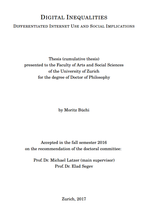Digital Inequalities: Differentiated Internet Use and Social Implications
2017
Büchi, Moritz
Doctoral dissertation. University of Zurich.
 |
Effective use of the Internet as a crucial information and communication network is increasingly necessary to participate in society. This thesis analyzes differences in everyday Internet use and discusses their social implications. A sociological digital inequality perspective based on the knowledge gap hypothesis forms the main theoretical framework. It assumes that Internet use depends on and contributes to social position. Quantitative international surveys were analyzed using structural equation modeling. Network and automated content analysis were additionally used on web data. Results show that general Internet uses can be grouped into four core purposes (information seeking, social interaction, entertainment, and commercial transaction). For valid cross-country comparisons of usage types, measurement invariance testing was found critical. There are pronounced second-level digital divides with consistent age, education, and experience effects. Differences in specific online activities—privacy protection, political participation, and science participation—are mainly explained by interests and Internet skills, and these in turn depend on social position. Overall, Internet use tends to reinforce social inequalities but policies aimed at enhancing Internet skills may counter this. The consequences for individuals’ subjective well-being is identified as a future avenue for empirical digital inequality research. |
